Interesting United States President Facts Part 1 (1st-12th President)
There have to date been 43 people who’ve held the highest political position in the United States since the founding of this republic under the current constitution. (And quite a few more Presidents under the old system, but we’ll ignore them in this piece.) Here now is a variety of interesting “President Facts” you may not know about every U.S. President. (And, if you’re curious, here are some interesting facts about the Presidents before George Washington.)
George Washington was taphephobic (irrationally terrified of being buried alive). On his death bed, he told his attendants “I am just going. Have me decently buried and do not let my body be put into the vault in less than three days after I am dead. Do you understand?”
This wasn’t quite as irrational in his day as it is now. Taphophobia hit its peak in the 18th and 19th centuries. In 1896, T.M. Montgomery, who was supervising the disinterment of remains at the Fort Randall Cemetery, reported that a little over 2% of those bodies exhumed were definitely victims of being accidentally buried alive. In other words, about 2% woke up, tried to claw their way out, and were unable to do so. Given the oxygen supply in a coffin doesn’t last that long, it is likely the actual percentage of people buried alive was higher, when you include the ones who didn’t wake, but were still technically alive when buried.
The reason the rate of being buried alive was quite high around this time was primarily due to the high number of people dying of various diseases like cholera, smallpox, etc. These people tended to not get a close investigation to make sure they were really dead, rather than just passed out, and they also tended to be buried quickly to prevent the spread of whatever disease they were thought to have died from. As another example, in the 17th century, William Tebb compiled a list of 219 instances of narrow escape from premature burial; 149 cases of actual premature burial; 10 cases in which bodies were accidentally dissected before death; and 2 cases in which embalming was started on the still living.
And note: George Washington did not have wooden teeth as is often said.
Adams had the nickname “His Rotundity”. This was because after Washington was elected the first President there was debate over what to officially call the President. The Senate meetings over this lasted about a month. Adams heavily argued for titles for the President that were highly pompous sounding, such as “His High Mightiness” and “His Majesty the President”. Eventually, the simpler title of “President of the United States” won out.
Adams was the first President to have a child who would become President, John Quincy Adams, the 6th President of the United States.
Thomas Jefferson didn’t just write the Declaration of Independence, he also re-wrote the Bible to his liking. Jefferson didn’t hold with the supernatural elements of the Bible. He thus set about making his own Jeffersonian translation that basically excluded every part he didn’t agree with, in his view, separating the wheat from the chaff.
I have done for my country, and for all mankind, all that I could do, and I now resign my soul, without fear, to my God, – my daughter to my country.”
He then went to sleep, but woke up later and said to the doctor, “Is it the 4th yet?” which were his somewhat less significant last words.
Madison was the shortest President to date, standing at just 5 ft. 4 inches tall and reportedly weighing in at about 100 lbs. Perhaps because of his small stature, he was the first President to commonly wear long legged trousers. The fashion at the time was knee breeches.
Madison is known as the “Father of the Constitution” and also was a key figure in the development and establishment of the Bill of Rights.
Monroe was elected for a second term in 1820 on a near unanimous vote, missing out by just one electoral college vote. This is today widely claimed to have been because said voter, William Plumer, supposedly felt no President except Washington should have the honor of a unanimous vote. However, this idea has no primary source and was only first proposed about a half a century after this election. The bigger nail in the coffin to this oft-repeated notion is that Plumer himself explicitly gave his reason for not voting for Monroe because he thought Monroe had behaved improperly in his first term. Instead, Plumer voted for a different Democratic-Republican John Quincy Adams. Plumer also refused to vote for Monroe’s vice president, Daniel Tompkins, because Plumer thought he had previously “grossly neglected his duty.”
Monroe was another President to die on July 4th, this time in 1831.
- His middle name is pronounced “kwin-zi” not “kwin-tsi” as pretty much every single person alive today pronounces it.
- Before becoming President and while a Senator, Adams was also a professor of logic at Brown University.
- During his time in office, Adams reduced the national debt from $16M to $5M.
- Unlike every other President except Andrew Jackson, after serving as President, Adams served in Congress, winning a seat in the U.S. House of Representatives in 1830, which he held for 17 years until his death.
- Adams was a longtime opponent of slavery, delighting in being “obnoxious to the slave faction”, in his own words. Among many other anti-slavery cases and arguments he was involved in, he took the stand in the famed Amistad case and argued for four hours on behalf of the Africans. The slaves were later freed. In another instance, Southern congressmen instituted a “gag rule” banning the discussion of slavery on the floor. Adams ignored the rule and did it anyways. Thanks to his political clout, he was able to get away with this where others would not have.
- His 50 volumes of his journal he kept from 1779-1848 are some of the most extensive first hand accounts of the formation of the United States from birth to his death.
- When he died on February 23, 1848, his last words were “This is the last of Earth. I am content.”
Before becoming President, Jackson killed a man for publicly calling him a “worthless scoundrel, a poltroon, and a coward”. The man, Charles Dickinson also insulted Jackson’s wife, calling her a bigamist. In fact, she was a bigamist, as she’d married Jackson while still technically married to her former husband. This scuffle between Dickinson and Jackson was all resulting from a dispute over a horse racing bet. You can read more about it here.
Jackson was the first President to be attacked while in office, Robert B. Randolph punched him and then ran away.
Jackson also was the first President who someone tried to kill, when a slightly insane man, Richard Lawrence, fired two guns at him, both of which misfired (but were miraculously later found to work perfectly). Jackson then beat the man with his cane, including continuing to do so after Lawrence had been subdued, with those around having to pull Jackson away from Lawrence to stop the beating. You can read more on this event here.
The first U.S. President that was born in the United States. He was also the first President not of Irish or British ancestry; his ancestors were Dutch.
Van Buren was also a key architect of the Democratic Party
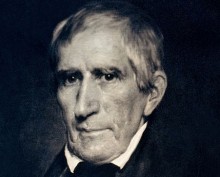 9) William Henry Harrison Facts:
9) William Henry Harrison Facts:
Harrison gave the longest inauguration speech in history, comprising 8,578 words and lasted about two hours… during a cold and wet day. He wore no coat or hat during this speech, which actually had been edited down by a friend of Harrison’s, Daniel Webster.
Harrison died a month later from pneumonia, giving him the record as the shortest stint as President to date. It should be noted, though, that while it’s often implied (and sometimes explicitly stated, such as in my old High School history book) that he died as a result of that lengthy speech in the cold, this is not the case. He did not get sick until three weeks after his speech. His doctors didn’t help, regularly bleeding him with leeches, among other “treatments”.
His last words, assumed to have been for Vice President John Tyler, though told to Harrison’s doctor as Tyler wasn’t there, were: “Sir, I wish you to understand the true principles of the government. I wish them carried out. I ask nothing more.”
Thanks to Harrison’s death, Tyler was not only the 10th Vice President, but also the 10th President of the United States. Several times leading up to the Presidency, Tyler attempted to bow out of politics and go back to practicing law and taking care of his family. He continued to find himself thrust back into the spotlight though, eventually being tacked on to Harrison’s Presidential ticket.
Upon Harrison’s election, Tyler moved back to his home in Williamsburg, expecting that as Vice President, he’d not have much of anything to do, so could simply stay at home and execute his plan of bowing out of politics, while still technically being Vice President. Obviously Harrison’s death thwarted his attempt at the quiet life.
Later in his life, Tyler was elected to the Congress of the Confederate States of America and was a supporter of the secession of the southern states.
As a child, Polk had a period in 1812 where his health went downhill. It was discovered that he had bladder stones that were too big to pass. Without any anesthetic other than brandy, and while being conscious through the whole thing, Dr. Ephraim McDowell operated on Polk, cutting him open and manually removing the stones from his bladder… Ouch.
Despite that such surgeries, apart from being amazingly painful, at the time also were high risk, he survived the ordeal just fine, though some have speculated it may have played a part in his apparent inability to have children.
At 49 years old when he was elected President, Polk was at the time the youngest to ever hold the office. He supposedly promised at the outset to serve just one term and to accomplish his four stated goals in that span: Reestablish an Independent Treasury System; reduce tariffs; Acquire New Mexico and California from Mexico; and Acquire the majority or all of Oregon Country. He did all this, making him possibly unique as a President, in that he did everything he promised to do and in the one term he promised to do it in.
Polk died just three months after leaving office, having apparently overworked himself (he lost a lot of weight while in office and his health gradually declined, supposedly from lack of rest). He also possibly contracted cholera in his farewell tour.
His last words were to his wife, who had helped him compose his speeches and who he nearly always ran his political decisions by to get her opinions on things: “I love you, Sarah. For all eternity, I love you.”
Polk inherited many slaves from his father, which he ordered all should be freed when his wife died (not before, so that she would be taken care of via the income from his plantation the slaves ran). This ended up being a moot point, as they were freed via the Emancipation Proclamation.
Because there were no school houses where he lived in Kentucky, Taylor had very little formal education. While he was considered to be a quick learner by one schoolmaster he eventually had, he was noted for his near unintelligible handwriting/spelling/grammar which resembled “that of a near illiterate”. While he may not have been book smart, he was a brilliant military leader, rapidly rising through the ranks and winning many a battle, including several where his forces were drastically outnumbered.
In one battle against Santa Anna himself leading 20,000 Mexican soldiers, Taylor commanded just 6,000 at the time (and only a few hundred regular army soldiers, the rest volunteers who hadn’t yet fought), having sent most of his forces away to join General Winfield Scott at the orders of President Polk. (It has been theorized by some that this was done to stop Taylor’s popularity from growing even further. By depriving him of most of his troops, it would stop him from being able to engage any forces.)
Rather than sit back on his largon, Taylor instead took his drastically diminished forces deeper into enemy territory. Santa Anna saw an opportunity to wipe out one of the U.S.’s armies, so raised an army and marched towards Taylor. Taylor’s 6,000 mostly new recruits lost just 600 during the fight, compared to 1,800 lost for Santa Anna. Santa Anna was, in the end, forced to retreat. If it was Polk’s plan to quell Taylor’s rising fame by having him get rid of most of his army, it backfired. This was hailed as one of the greatest military victories in U.S. military history and garnered Taylor comparisons with George Washington and Andrew Jackson in the media.
Because of his many brilliant victories against overwhelming odds, there started to be a push for him to run for President. Taylor responded to this: “Such an idea never entered my head, nor is it likely to enter the head of any sane person.” Quite.
Taylor died mysteriously while in office, after having contracted “bilious diarrhea or bilious cholera”, which was exasperated by the fact that his doctors had him bled and treated him with various things that were likely to have aided in killing him. In order to test whether he was actually poisoned, in 1991 his remains were exhumed and studied. No evidence of poisoning was found and it was determined that he probably died of “cholera morbus, or acute gastroenteritis”.
If you know any more interesting Presidential facts about any of the above, please leave them in the comments below. You can find facts about the rest of the Presidents here: Part 2, Part 3, Part 4.
| Share the Knowledge! |
|

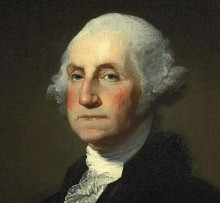
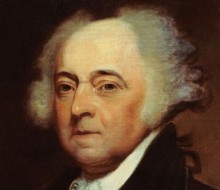
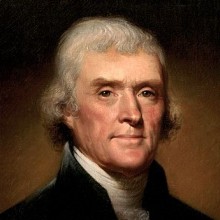
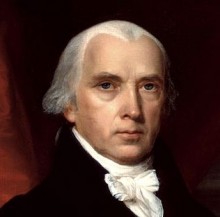
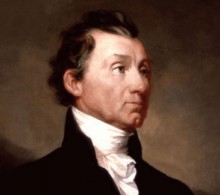
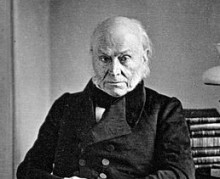
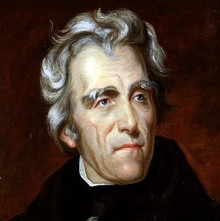
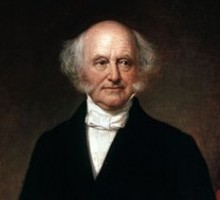
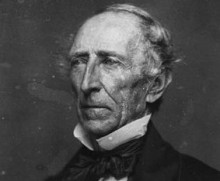
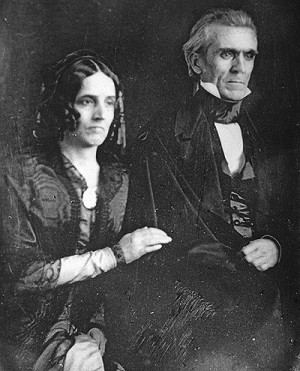
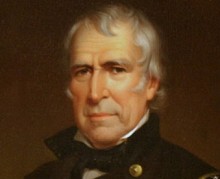




Your comments on George Washington were most interesting. My family comes from the Burns line, Mr. Burns (or Burnes) who owned much of the farm land where the White House, etc were built. The family site mentions the negotiations between Washington and that tough old Mr. Burns about the family farm land sale. The outcome, as I read it, was that his only daughter inherited all his holdings, including promises to pay from the federal govt, and then a default on the payment or lack of transfer of lands without payments. It is said that the daughter died, leaving it to her husband who promised to return title to the Burnes family. This was not done, so the story goes, and it would seem to be a flaw in the title to the said land, now quite valuable. This is interesting reading, but is it true? With your extensive historical background, could you tell us if this is true? And are there catacombs under the White House land?
death thwarted his attempt at the “quite” life
quiet
@random: Quite… 😉 Thanks for catching that 🙂
I am related to both President Polk and President Taylor on my mother’s side. That’s what they tell me.
Did you know that Franklin Pierce is the only president to ‘Affirm” rather than ‘Swear’ on the Constitution and not the bible when he was inaugurated?
It is also interesting to note that first Lady Barbara Bush is distantly related to Franklin Pierce.
I enjoy your website. But, I will point you to a correction. You listed Andrew Jackson as being the only former pre4sdient to sit in Congress following his tenure as president. It was Andrew Johnson who co-holds this distinction. He was a US Senator following his leaving the Presidency.
I should have proofed my text before I submitted it. In addition to the obvious spelling mistake, I should have noted that my comment was in reference to your assertion that John Q. Adams was the only former president “Unlike every other President except Andrew Jackson.” to have served in Congress following departure from the Presidency.
U.S presidents follow the legacy of king henry 8th,the man who gave teeth to church of england.Episcopal church the american avatar,carries forward the cavalier attitude of the king thru its various presidents of USA.